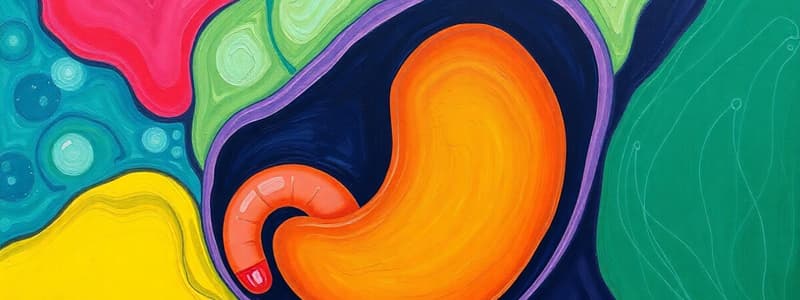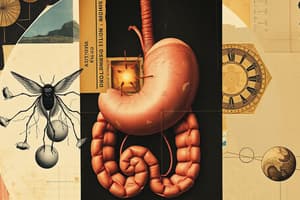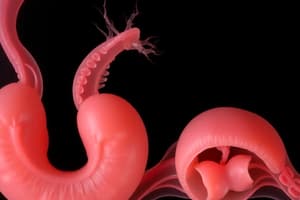Podcast
Questions and Answers
What structure does the dermomyotome specifically contribute to in the developing embryo?
What structure does the dermomyotome specifically contribute to in the developing embryo?
- Ectodermal tissues and cartilage
- Neural tube and vertebrae
- Myotome and dermis (correct)
- Dermis and notochord
What does the sclerotome develop into during embryonic development?
What does the sclerotome develop into during embryonic development?
- Skin and peripheral nerves
- Muscles and connective tissue
- Vertebrae and vertebral arch (correct)
- Brain and spinal cord
What is a primary outcome of the failure of the primitive streak to regress?
What is a primary outcome of the failure of the primitive streak to regress?
- Sacrococcygeal teratoma (correct)
- Anencephaly
- Encephalocele
- Spina bifida
Which neural tube defect is characterized by the absence of a major portion of the brain and skull?
Which neural tube defect is characterized by the absence of a major portion of the brain and skull?
Which of the following is NOT a common malformation resulting from neural tube closure issues?
Which of the following is NOT a common malformation resulting from neural tube closure issues?
What does the mesoderm develop into during gastrulation?
What does the mesoderm develop into during gastrulation?
During neurulation, what structure closes to form the neural tube?
During neurulation, what structure closes to form the neural tube?
Which layer gives rise to the lining of the gut?
Which layer gives rise to the lining of the gut?
What is the first structure to appear during gastrulation?
What is the first structure to appear during gastrulation?
What do cranial neural crest cells NOT give rise to?
What do cranial neural crest cells NOT give rise to?
Which of the following best describes somites?
Which of the following best describes somites?
What is the fate of trunk neural crest cells?
What is the fate of trunk neural crest cells?
When does fusion of the neural tube begin during neurulation?
When does fusion of the neural tube begin during neurulation?
Flashcards
Somites
Somites
Somites are segmented blocks of mesoderm that develop along the axis of the embryo. They have two primary components: the dermomyotome and the sclerotome.
Dermomyotome
Dermomyotome
The dermomyotome is a portion of the somite that develops into the dermis of the skin and the skeletal muscles of the body.
Sclerotome
Sclerotome
The sclerotome is a portion of the somite that develops into the vertebrae, the bony structures that form the spinal column.
Sacrococcygeal Teratoma
Sacrococcygeal Teratoma
Signup and view all the flashcards
Neural Tube Defects
Neural Tube Defects
Signup and view all the flashcards
Gastrulation
Gastrulation
Signup and view all the flashcards
Primitive Streak
Primitive Streak
Signup and view all the flashcards
Notochord
Notochord
Signup and view all the flashcards
Ectoderm
Ectoderm
Signup and view all the flashcards
Mesoderm
Mesoderm
Signup and view all the flashcards
Endoderm
Endoderm
Signup and view all the flashcards
Neurulation
Neurulation
Signup and view all the flashcards
Neural Crest Cells
Neural Crest Cells
Signup and view all the flashcards
Study Notes
Gastrulation
- Gastrulation, triggered by the appearance of the primitive streak, involves epiblast cells migrating through the streak.
- This process forms three germ layers: ectoderm, mesoderm, and endoderm.
- The notochord, a crucial structure derived from mesoderm, develops cranially in the midline.
Germ Layer Derivatives
- Ectoderm: Forms skin, hair, nails, sweat glands, brain, and spinal cord.
- Mesoderm: Forms paraxial mesoderm (axial skeleton, voluntary muscles, and parts of the dermis), intermediate mesoderm (urinary and part of genital systems), and lateral plate mesoderm (parts of limbs and dermis).
- Endoderm: Lines the gut.
Neurulation
- Neurulation, occurring during weeks 3 and 4, is the process of neural tube formation.
- The neural plate forms and subsequently closes to create the neural tube.
- Neural crest cells and neural tubes detach from the ectoderm.
- Closure begins cervically and progresses cranially towards neuropores.
- The cranial neuropore closes around day 24, and the caudal neuropore closes around day 26.
- Neurulation is complete with the closure of both neuropores.
Neural Crest Cell Derivatives
- Cranial Neural Crest: Forms cranial nerve ganglia, odontoblasts, eye-surrounding connective tissue, pharyngeal arch cartilages, facial and neck dermis, peripheral nervous system (PNS) Schwann cells, melanocytes, arachnoid and pia mater.
- Trunk (spinal) Neural Crest: Forms preaortic ganglia, adrenal medulla, dorsal root ganglia, sympathetic chain ganglia, PNS Schwann cells, melanocytes, arachnoid and pia mater.
Somites
- Somites develop from paraxial mesoderm during neurulation.
- Initially, somitomeres form, progressing cranially.
- Somites are paired structures.
- They're crucial for segmental body organization, contributing to the axial skeleton, neck muscles, body wall, and limbs.
Somite Components
- Dermomyotome: Contributes to skin dermis, body wall muscles, and limb muscles.
- Sclerotome: Forms vertebrae. The ventral portion forms the vertebral arch around the notochord, while the dorsal portion forms the vertebral arch flanking the neural tube.
Malformations
- Sacrococcygeal teratoma: A malformation resulting from a persistent primitive streak. It's composed of tissues from all three germ layers and considered a tumor.
- Neural Tube Defects (NTDs): Occur if the neural tube doesn't close properly. Potentially affecting CNS, vertebral arches, and skull formation leading to anencephaly, spina bifida, and encephalocele.
Studying That Suits You
Use AI to generate personalized quizzes and flashcards to suit your learning preferences.



